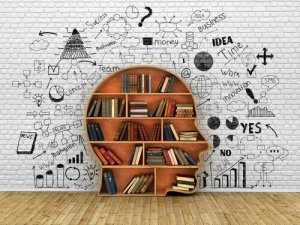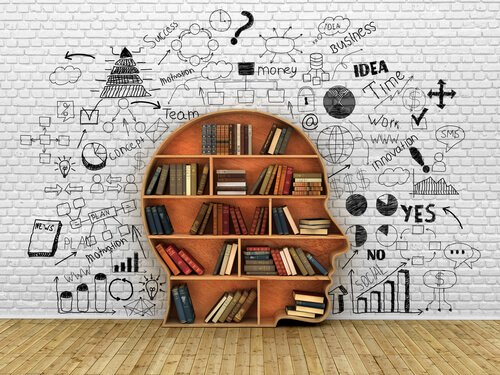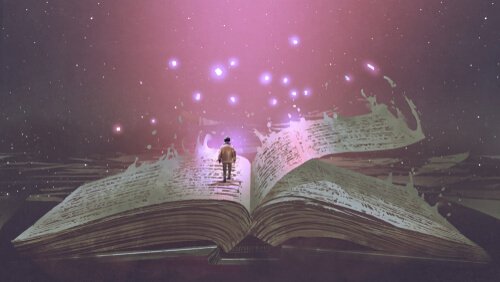Bibliotherapy: The Healing Power of Books

Reading is one of the best ways for human beings to cultivate their minds. Throughout history, books have instructed, entertained, and protected us. And on some occasions, they have also given us hope, shelter, and comfort. Some people even say that books have saved them. Bibliotherapy is a way to use the power of books to help ourselves both physically and mentally.
Books are magical. According to Freud, words and magic are the same. This is why we often seek refuge in books. The experience of healing through books is known as bibliotherapy.
There is no doubt that reading helps improve our emotional health. Reading has multiple benefits, even if we’re not aware of them. Its positive effect is demonstrated in people with emotional issues, mild or moderate mental disorders, and even physical problems. Let’s take a closer look.
Types of bibliotherapy
First, we need to distinguish between the two main types of bibliotherapy. Both are similar and typically have the same objective.
- Clinical: Its goal is for patients to change their attitude and behaviors. As a result, this type of therapy usually takes place in a hospital environment. This therapy is used to help people who are suffering from mood disorders, ADHD, or eating disorders. Books are used to provide information on a specific topic. They can help the patient focus on a specific aspect of their reality.
- Evolutionary or personal development: Its goal is personal growth. Groups or individuals read in a preventive or corrective manner. Libraries or educational centers are perfect places for this kind of bibliotherapy. This literature is based on proposing self-help methods, which contain exercises or personal learning tasks such as how to be more assertive, introduction to meditation, public speaking, etc.

The effects of bibliotherapy on the brain
“He’s a very well-read person.” Often, we usually use this phrase to refer to intellectual people. Reading sometimes gives us this intelligence. But reading, in addition to expanding knowledge, also provides many benefits at a therapeutic level.
Bibliotherapy offers answers in an entertaining, informative, and enriching way. It encourages us to change and allows us to find answers where before we only had doubts.
Curative distraction
Who hasn’t gotten sucked into a book and ended up in a different world? When we immerse ourselves in stories, we forget about our own concerns and problems. Instead, we fully focus on the narrative.
By getting away from our reality for a few minutes, we disconnect from our fears and concerns. This helps to improve our mood. And all this happens unconsciously.
Make it less dramatic
How often do we obsess about a problem and can’t stop thinking about it? Sometimes we end up making a mountain out of a molehill. We end up not being able to see beyond the mountain we created. In this situation, books can act as a strong gust of wind, whisking away our mountain and letting us breathe. It’s okay to be self-absorbed and focus on ourselves sometimes, but everything in moderation.
Bibliotherapy, in many cases, makes our situation feel less dramatic. Fiction helps us feel less alone and feel empathy for the characters’ problems. It gives us a broader perspective on life. It may even give the reader a sense of peace or a greater capacity for reflection.
Reading invites us to grow emotionally. Through this growth, we can gain inspiration and feel energized about the future. In fact, according to Dr. Raymond Mar, an expert on reading and the brain, reading creates similar brain activity to what would activate if you experienced what you were reading in real life.

Happiness
Ceridwen Dovey published an article in The New Yorker that discussed the healing power of bibliotherapy. “In a secular age, I suspect that reading fiction is one of the few remaining paths to transcendence, that elusive state in which the distance between the self and the universe shrinks. Reading fiction makes me lose all sense of self, but at the same time makes me feel most uniquely myself,” says Dovey.
Likewise, neuroscientists from Emory University in Atlanta also found encouraging results. They concluded that reading reduces stress levels and increases psychosocial development.
Empathy
The ability to put yourself in other people’s shoes and understand their emotions is eminently social. However, you don’t need to be surrounded by other people to develop empathy. Through bibliotherapy, words become a simulation of reality. Because of this, it’s a myth to think that reading is only for lonely people.
By understanding the development of stories and empathizing with the characters, we’re able to improve how we socialize with others. In addition, one of the contributing factors to the development of the famous theory of the mind is reading fiction.
Depression and anxiety
Reading-based treatment focused on treating anxiety and depression has had excellent results. In fact, the National Institute for Health and Care Excellence (NICE) recommends bibliotherapy to help these types of patients with mild cases. A campaign was launched in England that is aimed especially at young people called “Reading Well”. Because of this campaign, doctors can now prescribe reading for some types of mental disorders.
The healing power of books is significant. Although the results may not be immediate, reading benefits the body and mind in the long term. Why not try it out today?
This text is provided for informational purposes only and does not replace consultation with a professional. If in doubt, consult your specialist.








